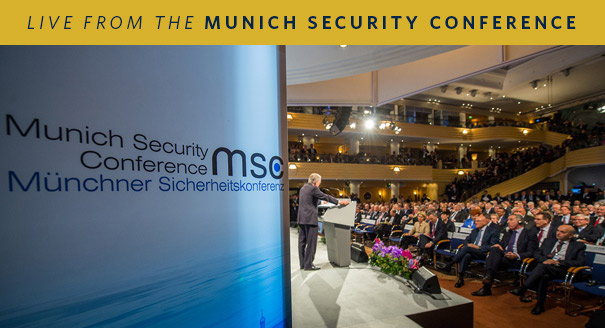Judy Dempsey
{
"authors": [
"Judy Dempsey"
],
"type": "commentary",
"blog": "Strategic Europe",
"centerAffiliationAll": "",
"centers": [
"Carnegie Endowment for International Peace",
"Carnegie Europe"
],
"collections": [
"Transatlantic Cooperation"
],
"englishNewsletterAll": "",
"nonEnglishNewsletterAll": "",
"primaryCenter": "Carnegie Europe",
"programAffiliation": "",
"programs": [],
"projects": [],
"regions": [
"Europe",
"North America",
"United States",
"Western Europe"
],
"topics": [
"Security"
]
}
Source: Getty
The West’s Vulnerability vs. the West’s Revival
Courage and leadership from democratic governments could pull the West back from disarray and growing irrelevance.
Carnegie Europe was on the ground at the 2017 Munich Security Conference, offering readers exclusive access to the debates as they unfolded and providing insights on today’s most urgent international issues. Check out our live coverage here.
*
The Munich Security Conference, which kicks off today in the Bavarian capital, pulls no punches with its new report. Called Post-Truth, Post-West, Post-Order?, the report is published to coincide with this annual event that brings together world leaders, diplomats, and defense and security experts. The title of the report is enough to convey, if not confirm, the sorry state of the West. The international order and liberal democracy are in crisis.
The new U.S. administration, Britain’s decision in June 2016 to leave the EU, and terrorism have exacerbated the vulnerability of the West at a time when it should be united and confident. European and American politicians are sparring with each other. With few exceptions—German Chancellor Angela Merkel for one—leaders on neither side of the Atlantic hold the moral high ground when it comes to defending the post-1945 structures that were designed to promote and protect values, stability, and democracy.
Europe is particularly vulnerable, and not just because it lacks the means to defend itself. The administration of U.S. President Donald Trump is unleashing an anti-Americanism in Europe that if not checked could erode the transatlantic relationship and further expose Europe’s weaknesses.
Leaders of populist movements in France, the Netherlands, and other countries have praised Trump’s election as a vindication of their antiglobalization, protectionist, and anti-Islam policies. At the same time, leaders of mainstream parties have rounded on the Trump administration. Bashing America has become fashionable. There is almost a certain glee or even schadenfreude about what is happening in the United States.
Yet this criticism from Europeans of the United States is misplaced and hypocritical because it is selective and inconsistent. Where is the criticism from Germany’s Social Democrats, from Hungarian and Austrian leaders, or from populist leaders of Russian President Vladimir Putin? Why are the leaders of the EU institutions reluctant to speak out against Russia for its hacking, cybersecurity attacks, misinformation, and opposition to leaders such as Merkel who want to uphold certain values and standards?
Meanwhile, the mainstream media in Europe criticizes the Trump administration for its pro-Russian stance, yet several European leaders could easily team up with the U.S. president on this issue.
This anti-Americanism could increase Europe’s vulnerability. For one thing, it plays into the hands of authoritarian regimes, be they in Russia or in China. They see the West as a competitor. The growing divisions between Europe and the United States weaken this competition.
At stake is whether the West will remain strong and confident enough to project values based on democracy, the rule of law, accountability, tolerance, and trading rules, or whether it will cede influence to political systems that challenge those principles. The West—meaning its community of democracies—is not going to prevail if its leaders do not speak out to defend Western values. Values have little meaning for the vulnerable, the unemployed, or those left behind by globalization.
All the more reason why governments should introduce measures to create buffers or social cushions rather than assume the political and economic elites can continue as before. Western leaders have to explain to their citizens not only the need for security but also the essential importance of protecting and defending Western values—socially, politically, and, if needed, militarily.
But the underlying theme of the MSC report is the West’s lack of preparedness—and its vulnerability. Unfortunately, this is not new, as previous reports have analyzed. What is different this time round is that confidence in the West is fading rapidly.
It’s going to demand courageous leaders to halt the decline of that confidence, or at least propose ways to revitalize the transatlantic relationship. Whatever comes out of this conference in Munich, it is clear that the United States cannot go it alone. As for Europe, it cannot afford to go it alone either, or indulge in America bashing. It’s obvious who the winners would be.
Photo by Munich Security Conference, used under CC BY-NC-SA 2.0 (cropped from original)
About the Author

Nonresident Senior Fellow, Carnegie Europe
Dempsey is a nonresident senior fellow at Carnegie Europe
- Europe Needs to Hear What America is SayingCommentary
- Babiš’s Victory in Czechia Is Not a Turning Point for European PopulistsCommentary
Judy Dempsey
Recent Work
Carnegie does not take institutional positions on public policy issues; the views represented herein are those of the author(s) and do not necessarily reflect the views of Carnegie, its staff, or its trustees.
More Work from Strategic Europe
- Europe on Iran: Gone with the WindCommentary
Europe’s reaction to the war in Iran has been disunited and meek, a far cry from its previously leading role in diplomacy with Tehran. To avoid being condemned to the sidelines while escalation continues, Brussels needs to stand up for international law.
Pierre Vimont
- Taking the Pulse: Can European Defense Survive the Death of FCAS?Commentary
France and Germany’s failure to agree on the Future Combat Air System (FCAS) raises questions about European defense. Amid industrial rivalries and competing strategic cultures, what does the future of European military industrial projects look like?
Rym Momtaz, ed.
- Macron Makes France a Great Middle PowerCommentary
France has stopped clinging to notions of being a great power and is embracing the middle power moment. But Emmanuel Macron has his work cut out if he is to secure his country’s global standing before his term in office ends.
Rym Momtaz
- How Europe Can Survive the AI Labor TransitionCommentary
Integrating AI into the workplace will increase job insecurity, fundamentally reshaping labor markets. To anticipate and manage this transition, the EU must build public trust, provide training infrastructures, and establish social protections.
Amanda Coakley
- Can Europe Still Matter in Syria?Commentary
Europe’s interests in Syria extend beyond migration management, yet the EU trails behind other players in the country’s post-Assad reconstruction. To boost its influence in Damascus, the union must upgrade its commitment to ensuring regional stability.
Bianka Speidl, Hanga Horváth-Sántha










